Makoto Yamauchi is taking comfort in a dizzying array of hangover cures, from clam elixirs to turmeric tonics, as Japan’s New Year party season gets into full swing.
The bottled drinks are a multimillion-dollar business in Japan and it is the season for recovery tonics as millions turn up to Shinnenkai gatherings to ring in the New Year with frosty mugs of beer.
“I always take hangover-prevention drinks before going out,” said Yamauchi, a 54-year-old exhibition builder.
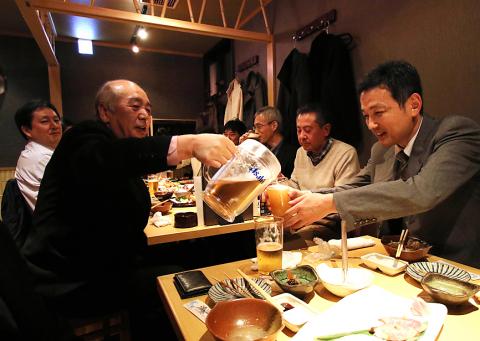
Warning: Excessive consumption of alcohol can damage your health
Photo: AFP
“I buy them about 10 times a month,” he added, on his way to a boozing session with friends in Tokyo’s bustling Ginza District.
Convenience stores across the nation are stocking up on top-selling Ukon no Chikara, whose faithful believe that gulping down the ¥205 (US$1.70) turmeric-based recipe before a night out would make the next day a breeze.
Turmeric is thought to work as an anti-inflammatory aid and antioxidant.
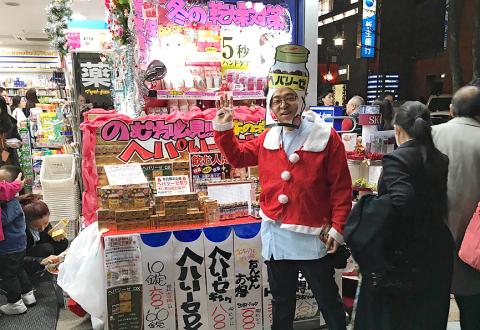
Photo: AFP
Other people swear by clam and watermelon-infused tonics, or Pocari Sweat — Japan’s cloudy, citrus-like answer to Gatorade.
The reputedly dreadful tasting Solmac, a mixture that includes leaf extracts, turmeric, ginseng and liquorice, is also said to do the trick.
For the day after, Japanese soul food like miso soup or sour pickled plums are popular to help replace all those lost electrolytes.
The market for liver-rescuing drinks is estimated to be worth about US$178 million this year, although the numbers have been declining as Japan’s fast-aging population get on the wagon.
As part of a broader health drive, Daiwa Securities, one of the nation’s biggest brokerage firms, is advising more than 13,000 domestic employees to take it easy on the sake and holiday food this year.
Still, Japan’s ubiquitous Izakaya pubs are packed and slumped-over workers remain a common sight on subways — prompting animated public service warnings about the dangers of a boozy tumble onto the tracks.
Zeria Pharmaceutical is expecting to chalk up big sales of its liquid and pill-based Hepalyse this holiday season, after rolling out the liver tonic in convenience stores four years ago.
“People find it easier to go to a convenience store rather than the pharmacy and it has also helped brand awareness,” a company spokesman said. “Convenience store sales have really boosted our revenues. The best sales month is December.”
Various types of Hepalyse, sold in tiny, delicate bottles, sell over the counter for about ¥257 to ¥450.
Demand for liquid replenishers is likely to stay strong, despite slipping sales in recent years, said Shun Yokoyama, an analyst specializing in health drinks at marketing research firm Fuji Keizai.
“One key feature of the Japanese market is that there’s a high demand for drinks to recover from situations that are bad for your health, such as a hangover,” Yokoyama said. “When you look at Japan from a global perspective, supplements don’t sell so well, but consumers want something to recover their health by replenishing their nutrition through drinks.”
That is no secret for 20-something office worker Misuzu, who reaches for low-sugar hangover cures to keep trim after consuming calorie-packed beverages.
“These drinks are good for office ladies — I buy the ones with fewer calories on nights when I plan to drink a lot,” she said. “They are excellent for turning a hard landing into a soft landing.”
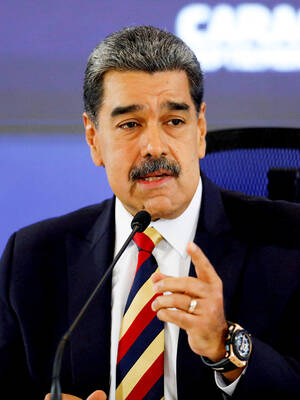
VENEZUELAN ACTION: Marco Rubio said that previous US interdiction efforts have not stemmed the flow of illicit drugs into the US and that ‘blowing them up’ would US President Donald Trump on Wednesday justified a lethal military strike that his administration said was carried out a day earlier against a Venezuelan gang as a necessary effort by the US to send a message to Latin American cartels. Asked why the military did not instead interdict the vessel and capture those on board, Trump said that the operation would cause drug smugglers to think twice about trying to move drugs into the US. “There was massive amounts of drugs coming into our country to kill a lot of people and everybody fully understands that,” Trump said while hosting Polish President

Japan yesterday heralded the coming-of-age of Japanese Prince Hisahito with an elaborate ceremony at the Imperial Palace, where a succession crisis is brewing. The nephew of Japanese Emperor Naruhito, Hisahito received a black silk-and-lacquer crown at the ceremony, which marks the beginning of his royal adult life. “Thank you very much for bestowing the crown today at the coming-of-age ceremony,” Hisahito said. “I will fulfill my duties, being aware of my responsibilities as an adult member of the imperial family.” Although the emperor has a daughter — Princess Aiko — the 23-year-old has been sidelined by the royal family’s male-only
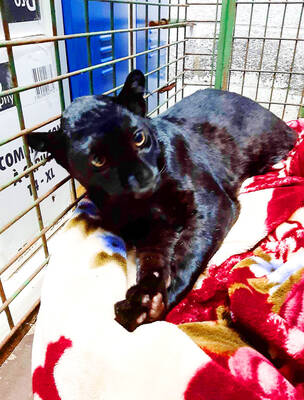
A French couple kept Louise, a playful black panther, in an apartment in northern France, triggering panic when she was spotted roaming nearby rooftops. The pair were were handed suspended jail sentences on Thursday for illegally keeping a wild animal, despite protesting that they saw Louise as their baby. The ruling follows a September 2019 incident when the months-old feline was seen roaming a rooftop in Armentieres after slipping out of the couple’s window. Authorities captured the panther by sedating her with anesthetic darts after she entered a home. No injuries were reported during the animal’s time on the loose. The court in the
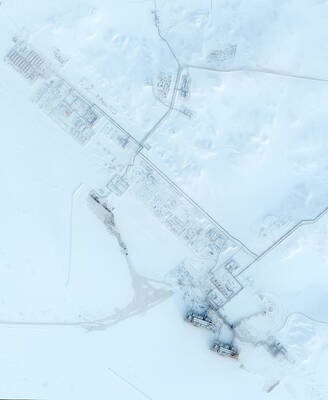
Another tanker carrying liquefied natural gas from Russia’s sanctioned Arctic LNG (liquefied natural gas) 2 project has docked in a Chinese port, ship-tracking data showed, days after Russian President Vladimir Putin met Chinese President Xi Jinping (習近平) in Beijing. The London Stock Exchange Group (LSEG) tracking data indicated the Russian Voskhod LNG tanker was anchored at an LNG terminal in the port of Tieshan in Guangxi, China. The Russian flagged tanker, with a cargo of 150,000 cubic meters of LNG, was loaded up at the Arctic LNG 2 facility in Gydan in northern Siberia on July 19, LSEG data showed.